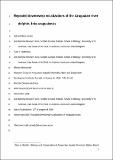Repeated downsweep vocalizations of the Araguaian river dolphin, Inia araguaiaensis
Abstract
Araguaian botos (Inia araguaiaensis) are known to produce pulsed as well as tonal sounds. This study documents the first evidence for repetitive sequences of downsweep whistles in botos that appear to be shared between individuals, and the context of their occurrence is investigated. Boat surveys were conducted along the Tocantins River located in the Eastern Amazon over a period of 42 days between 2012 and 2018. Eighty-two groups of Araguaian botos were observed, and 43 h of sound recordings were acquired. 632 downsweep whistles were recorded in 10 encounters. Four of these encounters contained downsweep bouts (21 bouts with ≥2 whistles) with short inter-call intervals (bout criterion 50 s) and up to 161 whistles. A statistical relationship was not found between downsweep occurrence and any of the contextual parameters that were investigated, including socializing, travelling, feeding, group size, presence of calves, and socio-sexual displays. The rarity of these signals makes them unlikely candidates for individual or group identification. It is more likely that they are associated with very specific contexts, such as nursing or mating, both of which were rarely observed in this study. Further studies are required to investigate context specificity and elucidate the function of these signals.
Citation
Melo-Santos , G , Walmsley , S F , Marmontel , M , Oliveira-da-Costa , M & Janik , V M 2020 , ' Repeated downsweep vocalizations of the Araguaian river dolphin, Inia araguaiaensis ' , Journal of the Acoustical Society of America , vol. 147 , pp. 748-756 . https://doi.org/10.1121/10.0000624
Publication
Journal of the Acoustical Society of America
Status
Peer reviewed
ISSN
0001-4966Type
Journal article
Description
Funding was provided by the Swarosvki Foundation and World Wide Fund for Nature Brazil.Collections
Items in the St Andrews Research Repository are protected by copyright, with all rights reserved, unless otherwise indicated.

